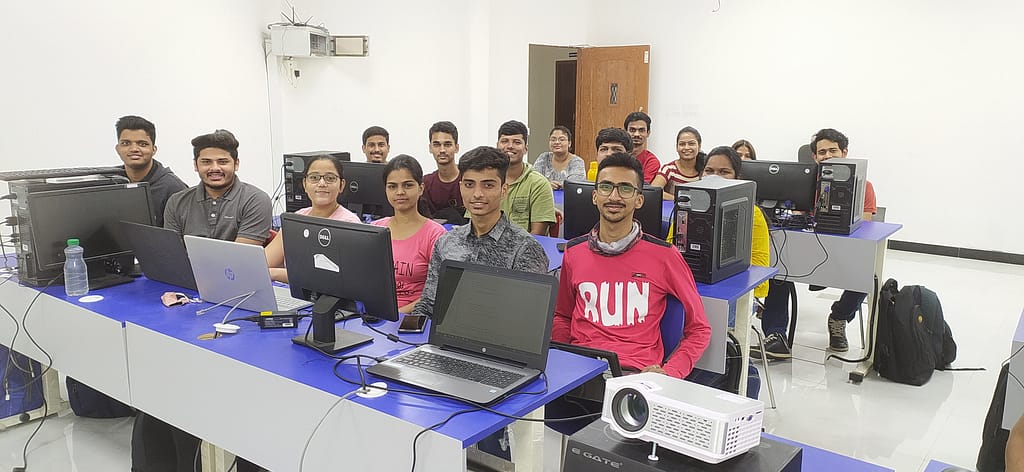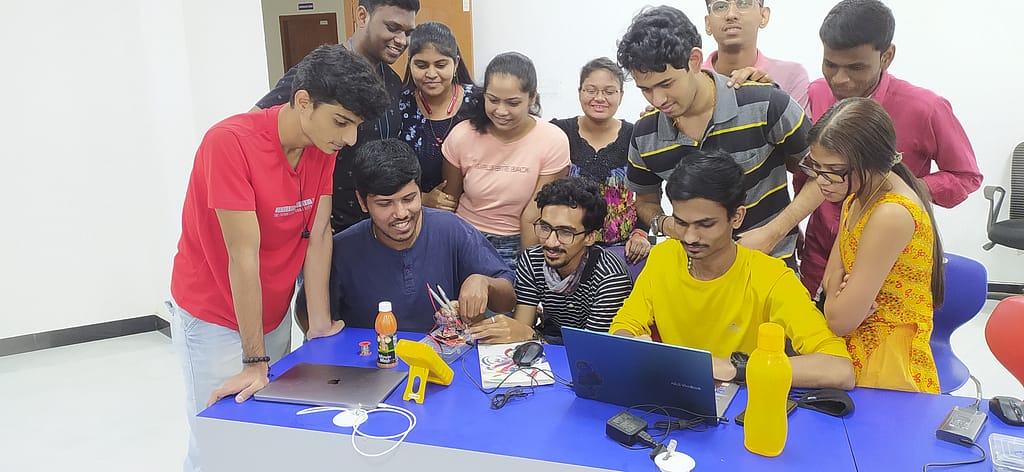Courses offered in Collaboration with Dr. D.Y.Patil University's RAIT
Microdevice Technologies is glad to announce it’s collaboration with D.Y.Patil University’s Ramrao Adik Institute of Technology
Under this arrangement various skill development programmes are on offer in online/offline mode of delivery.All the programmes can be offered with live trainer in online mode.IOT course is available in offline mode only.
Some of the courses offered are listed below:
- Embedded C (Level 0 Certification from SafeTTy Systems Ltd UK).
- Foundations of Reliable Embedded Systems (Level 1 Certification from SafeTTy Systems Ltd. UK)
- Internet of Things with Cloud and MSP432.(Available in offline mode only)
- Additional Programs are in the making.Keep watching this space
Syllabus
Embedded Systems Program
There are three Courses in this program
· Embedded C (Level 0) –Certification from SafeTTy Systems Ltd .UK
· Foundations of Reliable Embedded Systems (Level 1) Certification from SafeTTy Systems Ltd .UK
· Internet of Things with MSP432 and Cloud – Certification from Microdevice Technologies
Embedded C (Level 0) – Duration 30Hrs
Key features of this course
- Courseware designed by Dr. Michael J. Pont CEO SafeTTy Systems.
- A consistent focus on designing code that is safe and reliable.
- Course begins with the study of ARM architecture.
- A crash course on ‘C’ is included in the course itself, in case your skills are a little rusty.
- Use of TI CCS IDE.
- Creating a Simple Embedded OS; this is the starting point in learning about RTOS.
- International certification for candidates.
- Boost your profile for Post-Graduation in overseas universities.
- Open up career opportunities in mission critical industries.
- Program using Texas Instruments MSP432 ARM Cortex M4 kit.
Syllabus
- Overview of ARM architecture.
- Memory map of the ARM Cortex-Mx microcontroller.
- Timers of MSP432.
- Machine cycle and oscillator frequency calculations.
- SysTick Timer and its use in an Embedded OS
- Crash Course on C programming with focus on loops, functions, function prototypes, variable declaration and definition , pointers , typedefs , macros ,unsigned numbers .
- CCS environment.
- Creating project, building the target and running the code on target board.
- Understanding Energy trace in CCS.
- Reading Switches , Controlling Multi-colored LED
- Structuring Code and Object Oriented style of programming with C.
- Real Time constraints
- Creating a small Embedded OS.
- Multistate systems and function sequences.
- Generating PWM signal.
- Traffic signal system using FSM.
- Watchdog timer and their use in recovery from failure.
- Serial Port programming of MSP432
Certification Criteria
A one hour online exam would be conducted under university style conditions. Students have to secure a 70pcnt pass mark.
Foundations of Reliable Embedded Systems (Level 1) – Duration 60hrs
Key features of this course
- A consistent focus on the creation of reliable embedded systems in a wide range of sectors.
- Provides an introduction to modern Time-Triggered (TT) system architectures.
- Provides a solid foundation for people interested in the development of safety-related systems.
- Understand the key concepts of “real-time” systems and the importance of timing behaviour when creating reliable embedded systems.
- Understand key design and programming techniques which can help to improve the reliability of embedded systems for use in a range of different market sectors.
- Understand time-triggered (TT) software architectures.
- Understand how to test and debug existing embedded systems.
- Be ready for more advanced training in software design
- International certification for candidates
Syllabus
- What is an Embedded and a Deeply Embedded System?
- Discussion on 8051 architecture.
- Why use C?
- Difference between writing code for desktop and an embedded system and the differences in their software architecture.
- What are TASKS?
- What is a Real Time Embedded System?
- Accuracy of Loop Delays and Hardware Delays.
- What are Sandwich delays and why do we use them?
- What are timeout mechanisms and why and when do we need to timeout?
- What is the concept of balanced code?
- Concept of Worst Case Execution Time (WCET) and Best Case Execution Time (BCET) of Tasks.
- Understanding Interrupts and Interrupt response time.
- Understanding TT embedded operating system.
- Explore Co-operative and Hybrid schedulers and why we need them and when to employ them.
- How to handle Task Jitter?
- Timing analysis of tasks
- Compare 8-bit 8051, 32- bit ARM, soft processor implemented on FPGA and x86 platforms and how the performance is affected in each case. Which platform is reliable if employed in aero-space systems?
- What are multitasking systems?
- Running multiple tasks on a single CPU system with Task pre-emption. Here we learn about implementing a system employing a Hybrid scheduler. We also explore why a commercial RTOS may not be a good choice in systems where there are tight timing constraints.
- What is Priority Inversion and how to avoid it using Hybrid schedulers?
- What are distributed systems and their interconnection topologies?
- How are tasks running on different nodes synchronized in distributed systems?
- CAN protocol and its use in distributed systems.
Certification Criteria
- A two hour written exam would be conducted under university style conditions. Students have to secure a 70pcnt pass mark.
- 12 Coding and problem solving exercises that match given specifications have to be completed with proper documentation as specified in the manual
- Comprehensive Courseware with focus on foundations.
- A consistent focus on designing code using API and register level programming.
- Course begins with the study of Internet basics.
- A crash course on ADC fundamentals is included.
- Use of TI CCS IDE.
- Use of IBM Cloud.
- Learn Node-RED programming.
- Use of Energia in CCS.
- Program using Texas Instruments MSP432 ARM Cortex M4 kit and CC3100 Wi-Fi module.
Syllabus
- Overview of Internet fundamentals.
- Project creation using TI CCS and running the code on the target.
- Learn to use GPIO on the MSP432 Launchpad.
- ADC foundations with SAR ADC operation.
- Connect a Potentiometer to the analog channel.
- Calibrate the potentiometer using linear regression technique.
- Use the TI CC3100 Wi-Fi module along with the Launchpad board.
- Learn to use Energia to configure the Wi-Fi module.
- Code using API and register level programming in C.
- Install Node.js and Node-Red programming language on your local machine.
- Learn the fundamentals of Node-RED programming language.
- MQTT protocol basic concepts. Use MQTT protocol to communicate with the cloud.
- Create an account on the Cloud.
- Configure the Node-RED programming language on the cloud.
- Program on the cloud using Node-RED programming language.
- Send sensor reading to the cloud.
- Create a Dashboard on the cloud and send sensor reading to the Dashboard.
- Control the LED’s on the board through the Dashboard on the cloud
Certification Criteria
A one hour online exam would be conducted under university style conditions. Students have to secure a 60pcnt pass mark. This program is delivered at TIH-IOT IITB, VJTI, SPIT, Xavier Institute of Engineering to name a few organisations.
It has become extremely popular with Engineering Institutions.
It is an End-To-End system design program.
Training Center in Andheri, Mumbai




